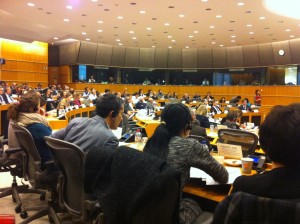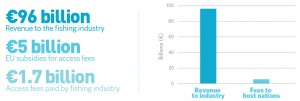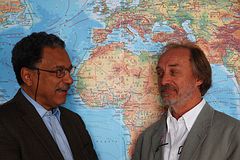
by Frédéric Le Manach
In 2009, the European Commission initiated the third reform of its Common Fisheries Policy. Although the basic principles of this new framework – which will stay in place for the next 10 years – were adopted in early February by the Parliament, the Commission is still regularly hearing experts on various topics. This process aims to propose specific amendments to this basic framework, before the final decision around June, once the Parliament, the Commission and the Council of Ministers reach a consensus (yes, this is a rather complex system). One of these hearings was held in Brussels on 19 February, and it focused on deep-sea fishing. Claire Nouvian invited me to attend, and although I was expecting a vivid debate, I was not expecting such vividness.
Claire Nouvian – a Pew Fellow, journalist, director/producer, director of BLOOM (www.bloomassociation.org), but principally woman of action – was one of eight experts heard by European Union (EU) members of parliament (MPs) during a special session on deep-sea fisheries. Other names in this group of experts included Tom Blasdale, chair of the ICES Working Group on the Biology and Assessment of Deep-Sea Fisheries Resources (WGDEEP); Phil Weaver from the UK’s National Oceanography Centre; Pascal Lorance from the French Research Institute for Exploitation of the Sea (Ifremer); and Matthew Gianni, co-founder of the Deep Sea Conservation Coalition. I will not go into much detail about these seven talks. To put it in a clamshell, everybody sort of agreed that deep-sea trawling is harmful to many long-lived species (such as fish, sponges and corals) and fragile ecosystems, and that we know very little about them (there are analytical assessments for only three species, and footage is very rarely available).
Claire introduced the French deep-sea fishery, and the bottom-line of her talk was that despite rather important subsidies, the three companies involved in French deep-sea fishing are all in deficit! The example of Scapêche, which takes between 60 and 86% of the total French deep-sea catch, is staggering: between 2002 and 2011 it received €9.34 million from the state, plus an additional €16.9 million cash-injection from Intermarché, the supermarket chain to which it belongs [1]. (If you are looking for a definition of vertically integrated systems, here you go.) Yet during this 2002-2011 exercise, it had €0.1 million of cumulated net losses after tax. A French MP, co-chair of the fisheries committee, then said something along these lines: “Are you saying that such companies are philanthropic? That they give away money to something that is not worth it? I don’t buy it!”
That was it. At this point the extremely politically correct way of telling white lies or saying nothing too controversial was abandoned for a much spicier and polarized argument. A couple of MPs started to shout, accusing each other of being blind or deaf. Others tried to be more constructive, as one British MP and another French MP said that we should start inquiring upon the use of EU citizens’ money, and further refuted the co-chair’s argument that because some fishers were relying on this fishery, we should maintain it despite a high risk of collapse for most stocks.
Then, we ran out of time. Big surprise. My personal feeling is that this hearing was designed to restrict the debate. Controversial topics were kept for the end, whereas they should have been at the forefront. As a result, I am actually quite confused about the outcome of this meeting. Of course, its aim was not to make decisions, but rather to propose amendments to the Common Fisheries Policy proposal that is currently being reformed. However, I cannot guess what these amendments will be. Some MPs are definitely pro deep-sea fishing, others are firmly against it, but a number of them remain undecided and they will likely base their vote on who shouts the loudest. (Please remember that empty vessels make the most noise.)
Isabella Lövin, Swedish MP and author of the must-read book Silent Seas, managed to get the deadline for these amendments postponed to mid-March. I will follow-up with a report on the progress.
You can listen to the entire meeting at:
www.europarl.europa.eu/ep-live/en/committees/video?event=20130219-1500-COMMITTEE-PECH
References
[1] http://www.bloomassociation.org/download/Accounts_Scapeche_Eng.pdf




